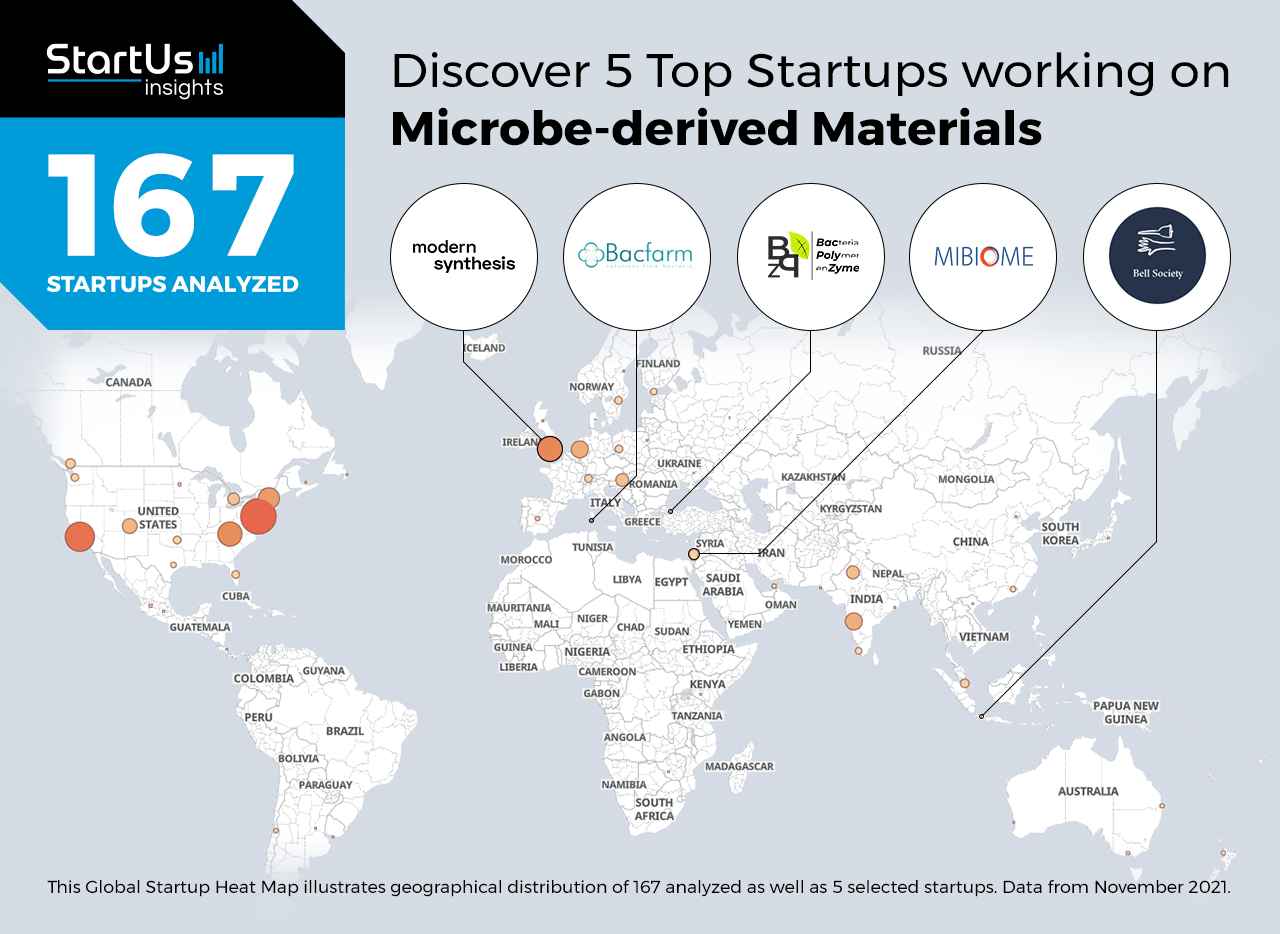Staying ahead of the technology curve means strengthening your competitive advantage. That is why we give you data-driven innovation insights into the materials industry. This time, you get to discover 5 hand-picked startups working on microbe-derived materials.
Out of 167, the Global Startup Heat Map highlights 5 Top Startups working on Microbe-derived Materials
The insights of this data-driven analysis are derived from the Big Data & Artificial Intelligence-powered StartUs Insights Discovery Platform, covering 2 093 000+ startups & scaleups globally. The platform gives you an exhaustive overview of emerging technologies & relevant startups within a specific field in just a few clicks.
The Global Startup Heat Map below reveals the distribution of the 167 exemplary startups & scaleups we analyzed for this research. Further, it highlights 5 materials startups that we hand-picked based on criteria such as founding year, location, funding raised, and more. You get to explore the solutions of these 5 startups & scaleups in this report. For insights on the other 162 micro-derived materials solutions, get in touch.
MiBiome produces Microbial Skin Therapeutics
Founding Year: 2017
Location: Jerusalem, Israel
Partner to advance Skin Probiotics
Israeli startup MiBiome formulates probiotic-based topical suspension. The startup’s SEKDA Probiotic Complex formulation consists of natural herb oils and probiotics to have synergistic effects on the dermal microbiome. Mibiome’s topical suspension is a patented therapeutic for dry, red, scaly skin, psoriasis, and eczema. Synthetic chemical-based formulations are harsh on the skin and cause allergic reactions. On the contrary, the startup’s microbe-based formulation naturally rebalances the skin microbial ecosystem.
Modern Synthesis enables Microbial Weaving
Founding Year: 2019
Location: London, UK
Collaborate with Modern Synthesis for Biotextile Fabrics
British startup Modern Synthesis develops materials through a microbial weaving process. The startup’s patented biofabrication process uses bacteria to produce customized bio textiles and composites. It leverages the Komagataeibacter rhaeticus bacteria to produce nanocellulose fibers. As it multiplies, the bacteria form a dense film of cellulose fiber. The naturally woven bacterial material serves as an alternative to plant-based cellulose fibers, plastics, and other conventional materials. In addition, it is natural, sustainable, and biodegradable.
BacPolyZyme offers Bacterial Cellulose
Founding Year: 2019
Location: Zufikon, Switzerland
Partner to develop Bio-based Materials
BacPolyZyme is a Swiss startup that provides bio-based materials using sustainable bioprocesses. The startup develops a natural polymer, BPZBioCell, using a microbial film-based fermentation process. BPZBioCell is bacterial cellulose that is biocompatible, biodegradable, and lightweight. It has unique characteristics like high water retention, permeability, and purity, making it viable for use in industries like paper, textiles, food, and pharma.
Bell Society provides Bioleather
Founding Year: 2018
Location: Cibeunying Kaler, Indonesia
Reach out to Bell Society for Vegan Leather Alternatives
Indonesian startup Bell Society develops a bioleather solution. The startup’s product, Misel, is produced from the bacterial conversion of organic substances, including fruit wastes. Bell Society aims to reduce the use of animal sources for leather by introducing waste-based leather products. Misel utilizes 10 times less water per square foot compared to conventional cowhide leather. This allows apparel manufacturers to transition to sustainable sourcing and decrease their carbon footprint.
Bacfarm produces Microbe-based Ultraviolet (UV) Screens
Founding Year: 2019
Location: Cagliari, Italy
Partner for: Naturally-Sourced UV Filters
Bacfarm is an Italian startup that offers bacteria-based materials. The startup exploits the strong resistance characteristics of extremophilic bacteria to offer tailor-made materials. One of its materials, Pink Layer, is derived from the S-layer of the cell wall of Deinococcus radiodurans. It is highly resistant to radiation and finds use as a UV filter in cosmetics and dermal medications.
Discover more Materials Startups
Materials startups such as the examples highlighted in this report focus on sustainable materials, bio-based materials, and waste-to-material solutions. While all of these technologies play a major role in advancing the materials industry, they only represent the tip of the iceberg. To explore more materials technologies, simply get in touch to let us look into your areas of interest. For a more general overview, you can download our free Materials Innovation Report to save your time and improve strategic decision-making.









